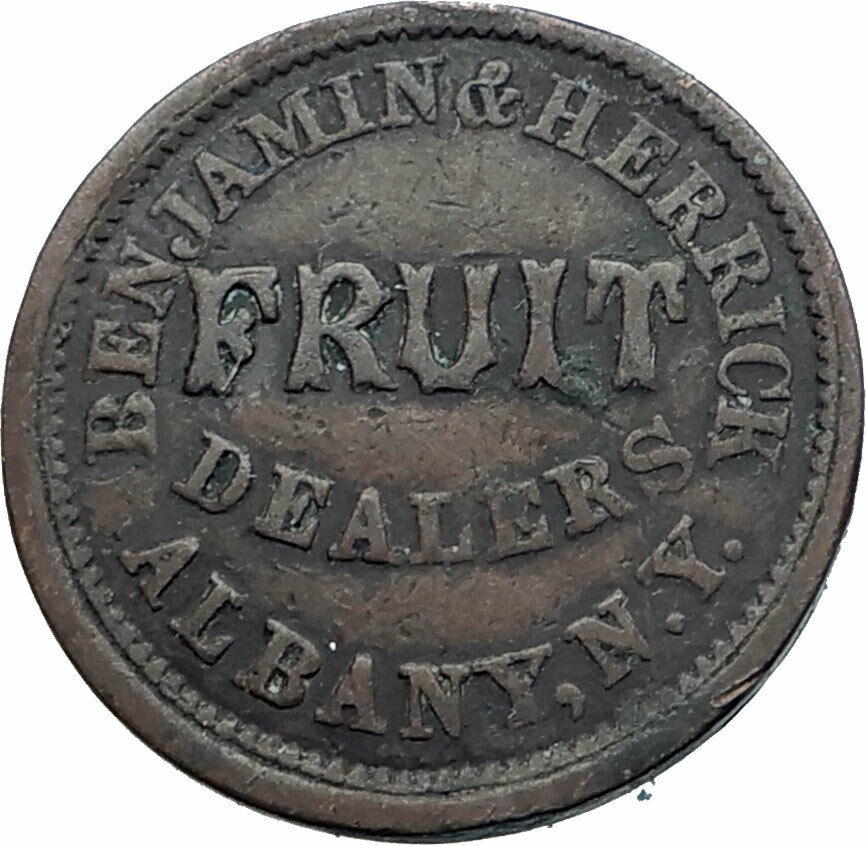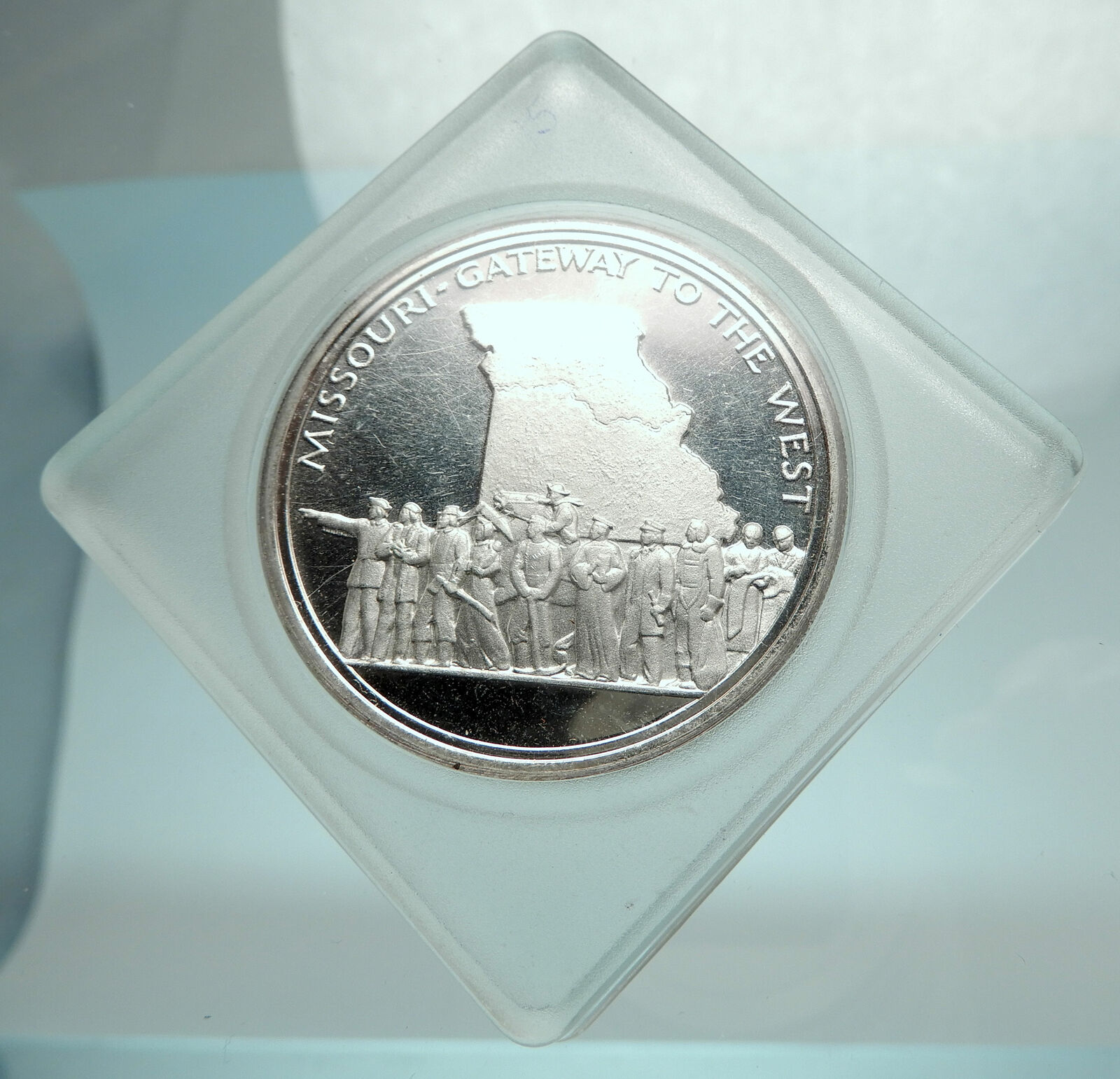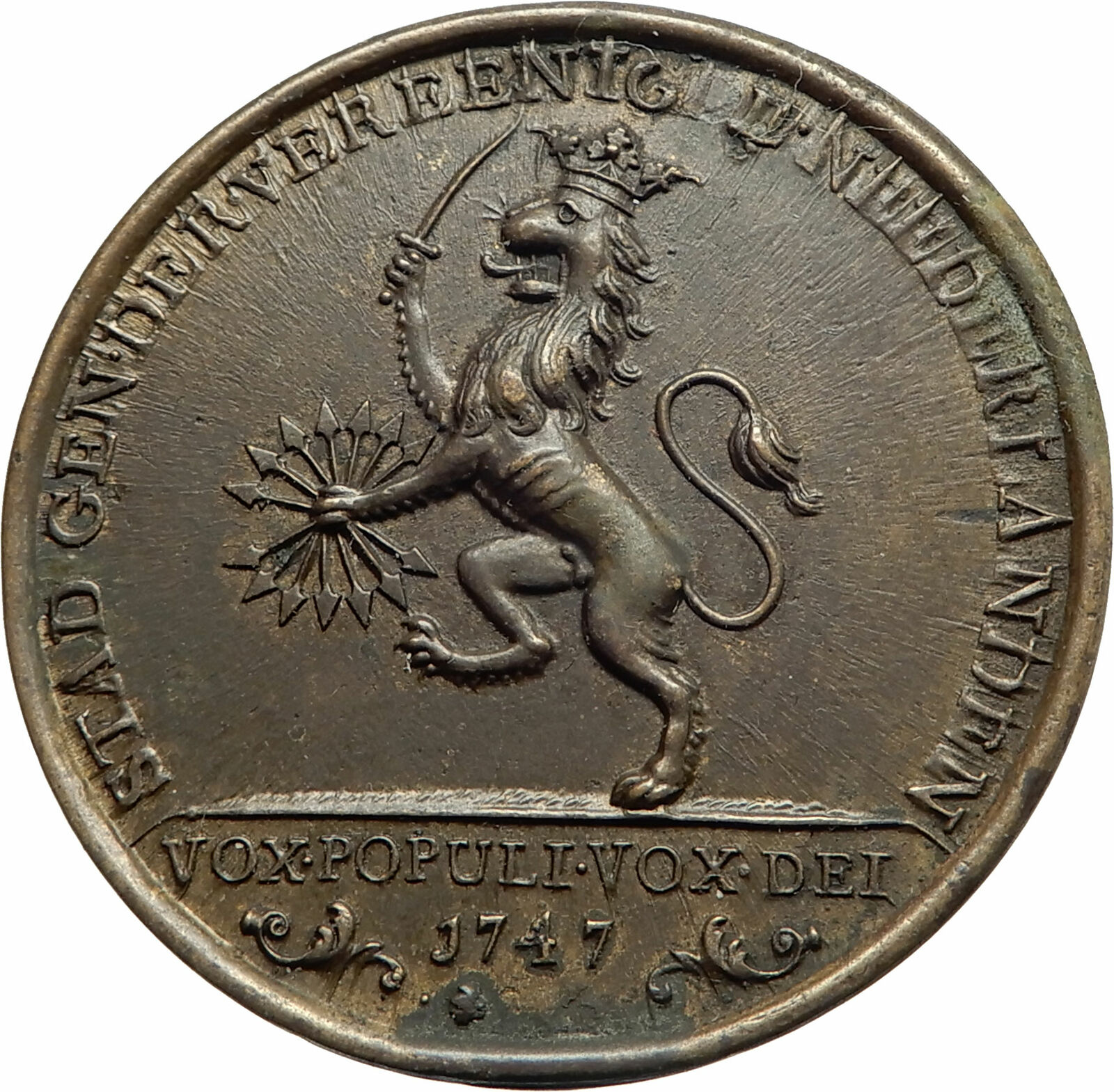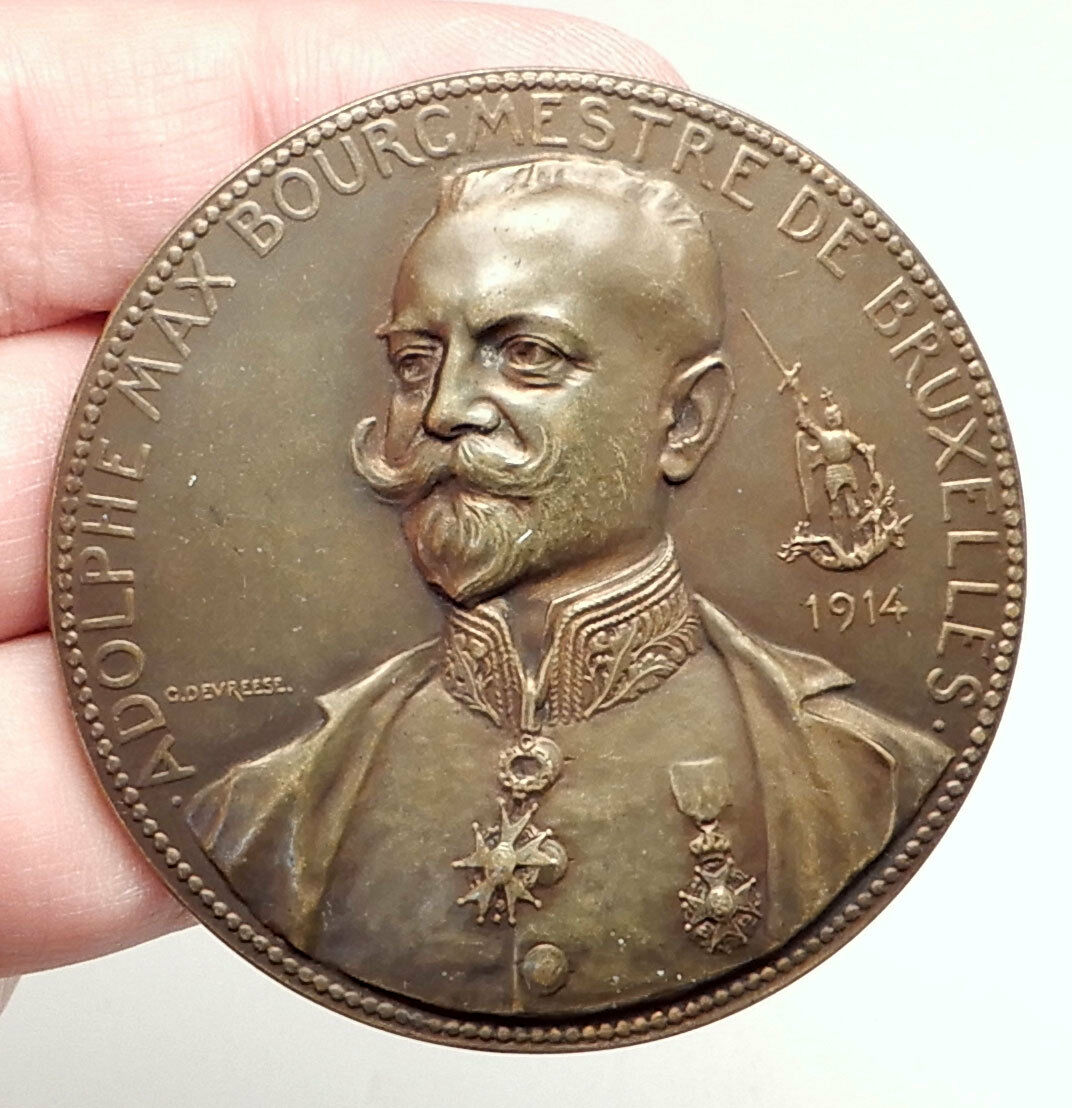|
Spain – Columbus Discovers America – 500 Years
1992 Bronze Medal 37mm (30.85 grams)
Reference: N# 176035
ENCUENTRO.DE.DOS.MUNDOS .LAS TRES CARABELAS., Columbus’ ships.
QUINTO CENTENARIO 500 1492 – 1992, Crowned denomination.
You are bidding on the exact item pictured, provided with a Certificate of Authenticity and Lifetime Guarantee of Authenticity.
 Christopher Columbus (/kəˈlʌmbəs/; born between 25 August and 31 October 1451, died 20 May 1506) was an Italian navigator who completed four voyages across the Atlantic Ocean, opening the way for the widespread European exploration and colonization of the Americas. His expeditions, sponsored by the Catholic Monarchs of Spain, were the first European contact with the Caribbean, Central America, and South America. Christopher Columbus (/kəˈlʌmbəs/; born between 25 August and 31 October 1451, died 20 May 1506) was an Italian navigator who completed four voyages across the Atlantic Ocean, opening the way for the widespread European exploration and colonization of the Americas. His expeditions, sponsored by the Catholic Monarchs of Spain, were the first European contact with the Caribbean, Central America, and South America.
The name Christopher Columbus is the Anglicisation of the Latin Christophorus Columbus. Scholars generally agree that Columbus was born in the Republic of Genoa and spoke a dialect of Ligurian as his first language. He went to sea at a young age and travelled widely, as far north as the British Isles and as far south as what is now Ghana. He married Portuguese noblewoman Filipa Moniz Perestrelo and was based in Lisbon for several years, but later took a Castilian mistress; he had one son with each woman. Though largely self-educated, Columbus was widely read in geography, astronomy, and history. He formulated a plan to seek a western sea passage to the East Indies, hoping to profit from the lucrative spice trade. Following Columbus’s persistent lobbying to multiple kingdoms, Catholic monarchs Queen Isabella I and King Ferdinand II agreed to sponsor a journey west. Columbus left Castile in August 1492 with three ships, and made landfall in the Americas on 12 October (ending the period of human habitation in the Americas now referred to as the pre-Columbian era). His landing place was an island in the Bahamas, known by its native inhabitants as Guanahani. Columbus subsequently visited the islands now known as Cuba and Hispaniola, establishing a colony in what is now Haiti. Columbus returned to Castile in early 1493, bringing a number of captured natives with him. Word of his voyages soon spread throughout Europe.
Columbus made three further voyages to the Americas, exploring the Lesser Antilles in 1493, Trinidad and the northern coast of South America in 1498, and the eastern coast of Central America in 1502. Many of the names he gave to geographical features—particularly islands—are still in use. He also gave the name indios (“Indians”) to the indigenous peoples he encountered. The extent to which he was aware that the Americas were a wholly separate landmass is uncertain; he never clearly renounced his belief that he had reached the Far East. As a colonial governor, Columbus was accused by his contemporaries of significant brutality and was soon removed from the post. Columbus’s strained relationship with the Crown of Castile and its appointed colonial administrators in America led to his arrest and removal from Hispaniola in 1500, and later to protracted litigation over the benefits that he and his heirs claimed were owed to them by the crown. Columbus’s expeditions inaugurated a period of exploration, conquest, and colonization that lasted for centuries, helping create the modern Western world. The transfers between the Old World and New World that followed his first voyage are known as the Columbian exchange.
Columbus was widely venerated in the centuries after his death, but public perception has fractured in recent decades as scholars give greater attention to the harm committed under his governance, particularly the near-extermination of Hispaniola’s indigenous Taíno population from mistreatment and European diseases, as well as their enslavement. Proponents of the Black Legend theory of history claim that Columbus has been unfairly maligned as part of a wider anti-Catholic sentiment. Many places in the Western Hemisphere bear his name, including the country of Colombia, the District of Columbia, and the Canadian province of British Columbia.
 Spain, officially the Kingdom of Spain (Spanish: Reino de España), is a country mostly located on the Iberian Peninsula in Europe, with there also being two large archipelagoes, the Balearic Islands in the Mediterranean Sea and the Canary Islands off the African Atlantic coast, two cities, Ceuta and Melilla, on the African mainland and several small islands in the Alboran Sea near the African coast. The country’s mainland is bordered to the south and east by the Mediterranean Sea except for a small land boundary with Gibraltar; to the north and northeast by France, Andorra, and the Bay of Biscay; and to the west and northwest by Portugal and the Atlantic Ocean. It is the only European country to have a border with an African country (Morocco) and its African territory accounts for nearly 5% of its population, mostly in the Canary Islands but also in Ceuta and Melilla. Spain, officially the Kingdom of Spain (Spanish: Reino de España), is a country mostly located on the Iberian Peninsula in Europe, with there also being two large archipelagoes, the Balearic Islands in the Mediterranean Sea and the Canary Islands off the African Atlantic coast, two cities, Ceuta and Melilla, on the African mainland and several small islands in the Alboran Sea near the African coast. The country’s mainland is bordered to the south and east by the Mediterranean Sea except for a small land boundary with Gibraltar; to the north and northeast by France, Andorra, and the Bay of Biscay; and to the west and northwest by Portugal and the Atlantic Ocean. It is the only European country to have a border with an African country (Morocco) and its African territory accounts for nearly 5% of its population, mostly in the Canary Islands but also in Ceuta and Melilla.
 .svg/85px-Escudo_de_España_(mazonado).svg.png)
Flag & Coat of Arms
With an area of 505,990 km2 (195,360 sq mi), Spain is the largest country in Southern Europe, the second largest country in Western Europe and the European Union, and the fourth largest country in the European continent. By population, Spain is the sixth largest in Europe and the fifth in the European Union. Spain’s capital and largest city is Madrid; other major urban areas include Barcelona, Valencia, Seville, Bilbao and Málaga.
Modern humans first arrived in the Iberian Peninsula around 35,000 years ago. Iberian cultures along with ancient Phoenician, Greek and Carthaginian settlements developed on the peninsula until it came under Roman rule around 200 BCE, after which the region was named Hispania, based on the earlier Phoenician name Sp(a)n or Spania. At the end of the Western Roman Empire the Germanic tribal confederations in migration from Central Europe invaded the Iberian peninsula and established themselves in relatively independent realms in its western provinces, including the Sueves, Alans and Vandals. Eventually, the Visigoths would integrate by force all remaining independent territories in the peninsula, including Byzantine provinces into the Kingdom of Toledo that more or less unified politically, ecclesiastically and legally all the former Roman provinces or successor kingdoms of what was then known in documents as Hispania.
The Visigothic kingdom fell to the Moors except in the north where shortly after started a process known as Reconquista. Spain emerged as a unified country in the 15th century under the Catholic Monarchs, who completed the eight centuries-long Reconquista in 1492. In the early modern period, Spain became one of history’s first global empires, leaving a vast cultural and linguistic legacy that includes over 500 million Hispanophones, making Spanish the world’s second most spoken native language, after Mandarin Chinese.
Spain is a parliamentary democracy and constitutional monarchy, with King Felipe VI as head of state. It is a major developed country with the world’s fourteenth largest economy by nominal GDP and sixteenth largest by purchasing power parity. It is a member of the United Nations (UN), the European Union (EU), the Eurozone, the Council of Europe (CoE), the Organization of Ibero-American States (OEI), the Union for the Mediterranean, the North Atlantic Treaty Organization (NATO), the Organisation for Economic Co-operation and Development (OECD), OSCE, the Schengen Area, the World Trade Organization (WTO) and many other international organisations. Spain has a “permanent invitation” to the G20 summits that occur generally once a year.
|




 Christopher Columbus (/kəˈlʌmbəs/; born between 25 August and 31 October 1451, died 20 May 1506) was an Italian navigator who completed four voyages across the Atlantic Ocean, opening the way for the widespread European exploration and colonization of the Americas. His expeditions, sponsored by the Catholic Monarchs of Spain, were the first European contact with the Caribbean, Central America, and South America.
Christopher Columbus (/kəˈlʌmbəs/; born between 25 August and 31 October 1451, died 20 May 1506) was an Italian navigator who completed four voyages across the Atlantic Ocean, opening the way for the widespread European exploration and colonization of the Americas. His expeditions, sponsored by the Catholic Monarchs of Spain, were the first European contact with the Caribbean, Central America, and South America. Spain, officially the Kingdom of Spain (Spanish: Reino de España), is a country mostly located on the Iberian Peninsula in Europe, with there also being two large archipelagoes, the Balearic Islands in the Mediterranean Sea and the Canary Islands off the African Atlantic coast, two cities, Ceuta and Melilla, on the African mainland and several small islands in the Alboran Sea near the African coast. The country’s mainland is bordered to the south and east by the Mediterranean Sea except for a small land boundary with Gibraltar; to the north and northeast by France, Andorra, and the Bay of Biscay; and to the west and northwest by Portugal and the Atlantic Ocean. It is the only European country to have a border with an African country (Morocco) and its African territory accounts for nearly 5% of its population, mostly in the Canary Islands but also in Ceuta and Melilla.
Spain, officially the Kingdom of Spain (Spanish: Reino de España), is a country mostly located on the Iberian Peninsula in Europe, with there also being two large archipelagoes, the Balearic Islands in the Mediterranean Sea and the Canary Islands off the African Atlantic coast, two cities, Ceuta and Melilla, on the African mainland and several small islands in the Alboran Sea near the African coast. The country’s mainland is bordered to the south and east by the Mediterranean Sea except for a small land boundary with Gibraltar; to the north and northeast by France, Andorra, and the Bay of Biscay; and to the west and northwest by Portugal and the Atlantic Ocean. It is the only European country to have a border with an African country (Morocco) and its African territory accounts for nearly 5% of its population, mostly in the Canary Islands but also in Ceuta and Melilla.
.svg/85px-Escudo_de_España_(mazonado).svg.png)





